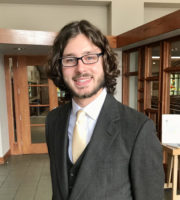
One student allegedly created backchannels for prisoner communications
The University of Chicago suspended a prison writing partnership with the Cook County Jail after allegations of misconduct arose against several student volunteers, including one who describes herself as an “abolitionist.”
The Institute of Politics runs the program with the sheriff’s office, who administers the prison system.
However, the jail is now the subject of a federal lawsuit, as students allege their First Amendment rights are being violated. The county alleges the students created a backchannel communication system for prisoners.
“We have suspended this specific cohort for the remainder of the academic year because of what the jail is describing as very serious violations of their code of conduct on the part of some of our students,” spokesman Koran Addo told The College Fix recently in a phone interview.
One student, Nora Pomper, “provided detainees with at least three separate phone numbers to contact her from the [prison] and has received at least 180 discrete phone calls from detainees,” attorneys for the prison system wrote in a May court filing. She also “exchanged nearly 2,000 text messages,” with prisoners, the county alleged.
Pomper (pictured) is a graduate student at the university. “I build community power across jail walls through abolitionist pedagogy and practice,” according to her LinkedIn page. “Through writing, teaching, and organizing, I am devoted to creating liberatory learning and organizing spaces rooted in community care and disability justice.”
According to attorneys, “Pomper is suspected of attempting to set up an extra-procedural grievance system outside of the knowledge or control of the [jail system], in which detainees call an answering service controlled by Pomper with their complaints.”
Pomper, who also goes by the first name Harley, and fellow student Ethan Ostrow both lost their security clearances to enter the prison, prompting the First Amendment lawsuit.
They alleged in their lawsuit it was because of their criticism in the Chicago Sun Times of jail policies about bringing in paper products. Sheriff Tom Dart instituted the ban due to concerns about “drug-laced paper.” The jail says it does not have a blanket ban on paper products, as the students suggested.
Ostrow and Pomper wrote these new policies amounted to a “paper ban” and came at a high cost to “intellectual freedom.”
“Reading and writing serve not only as coping mechanisms but surrogates for formal education, job training, legal research, mental health care and more,” Ostrow and Pomper wrote in the Chicago Sun Times. “In reality, a ban on paper products is a ban on education, expression and exploration — harms that far outweigh the protection against drug abuse officials hope to provide.”
Neither student responded to multiple emails from The Fix sent in the past weeks asking for further comment on the lawsuit. Their attorney, Brad Thomson, has not responded to a voicemail message left on May 27.
Ostrow helped facilitate the program, though the county’s filing states it is not clear if he knew everything Pomper was doing.
The sheriff’s office said the claims of the students were “factually inaccurate” in an emailed statement to The Fix.
“We didn’t ban paper and we didn’t deny individuals their legal documents,” a spokesperson for Sheriff Dart told The Fix. “We did institute some regulations to stop the spread of drug-soaked paper that was causing people to die in jail.”
“And we maintained access to legal documents, books, magazines, personal mail, and paper for programs just like the one the students took part in,” the spokesperson said.
University seeks to restore ‘good standing’ with jail
The university said it takes work to get programs like this up and running and the school will look into how to prevent future problems.
Addo, the spokesman, said “it is a tight-rope getting these sorts of programs off the ground and making sure that the i’s are dotted and the t’s crossed.”
“We will be making sure that protocols are in place to make sure that there is not a repeat of some of the behavior that we saw this year, and making sure that our relationship with the jail is in good standing so that we can deliver this program,” Addo told The Fix.
“We need to be good partners in this,” Addo said.
“We are proud of our programs, proud of our students who are finding a path to civic service. This is an unfortunate situation where it looks like rules were broken, and it put us in a precarious position in our relationship with the jail,” Addo said. “We have to be good partners.”
Addo said the Institute of Politics has two other similar initiatives in good standing, one on civic education and another creative writing program.
MORE: ‘Visualizing abolition studies’ program launches at UC Santa Cruz
IMAGE: Harley Pomper/LinkedIn
Like The College Fix on Facebook / Follow us on Twitter






Please join the conversation about our stories on Facebook, Twitter, Instagram, Reddit, MeWe, Rumble, Gab, Minds and Gettr.